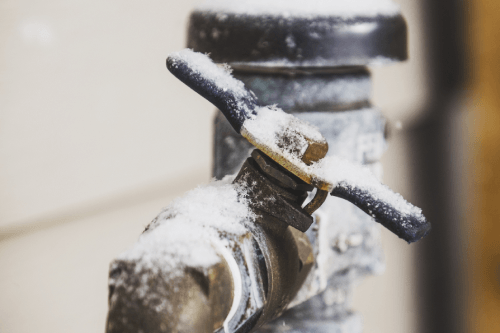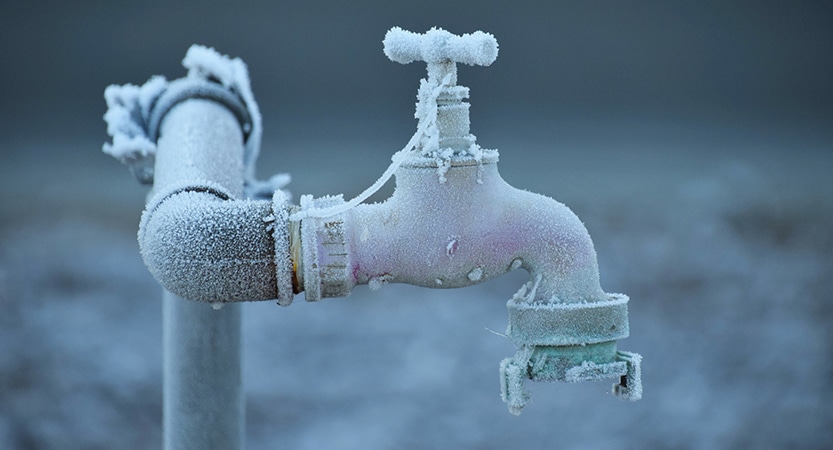Safeguarding Pipes from Cold Weather Issues: Essential Approaches
Safeguarding Pipes from Cold Weather Issues: Essential Approaches
Blog Article
Listed here in the next paragraphs you will find a good deal of exceptional advice concerning 6 Ways to Prevent Frozen Pipes.

Winter can damage your plumbing, particularly by freezing pipelines. Right here's just how to avoid it from taking place and what to do if it does.
Intro
As temperature levels drop, the risk of frozen pipes increases, potentially bring about pricey repair services and water damage. Recognizing exactly how to stop icy pipelines is vital for property owners in cool climates.
Avoidance Tips
Protecting at risk pipes
Wrap pipelines in insulation sleeves or make use of warmth tape to protect them from freezing temperatures. Focus on pipes in unheated or exterior areas of the home.
Home heating methods
Keep interior rooms sufficiently heated, particularly locations with pipes. Open cabinet doors to allow cozy air to distribute around pipes under sinks.
How to recognize frozen pipes
Look for lowered water circulation from taps, unusual odors or sounds from pipes, and noticeable frost on revealed pipes.
Long-Term Solutions
Architectural adjustments
Think about rerouting pipelines far from outside walls or unheated locations. Add additional insulation to attics, basements, and crawl spaces.
Updating insulation
Purchase premium insulation for pipes, attic rooms, and wall surfaces. Correct insulation aids preserve consistent temperature levels and reduces the risk of frozen pipelines.
Safeguarding Outdoor Plumbing
Garden hose pipes and exterior faucets
Detach and drain garden tubes before winter months. Set up frost-proof faucets or cover outside faucets with insulated caps.
Understanding Icy Pipes
What triggers pipelines to freeze?
Pipelines freeze when subjected to temperature levels listed below 32 ° F (0 ° C) for extended periods. As water inside the pipes freezes, it broadens, taxing the pipe wall surfaces and potentially causing them to rupture.
Risks and problems
Icy pipes can cause water system interruptions, building damages, and costly repair services. Burst pipelines can flooding homes and cause extensive structural damage.
Indicators of Frozen Pipes
Recognizing frozen pipelines early can prevent them from breaking.
What to Do If Your Pipelines Freeze
Immediate activities to take
If you suspect frozen pipelines, keep faucets open up to soothe pressure as the ice thaws. Use a hairdryer or towels taken in hot water to thaw pipelines slowly.
Conclusion
Protecting against icy pipes needs aggressive steps and fast responses. By recognizing the reasons, indicators, and safety nets, homeowners can protect their plumbing throughout winter.
Helpful Tips to Prevent Frozen Pipes this Winter
UNDERSTANDING THE BASICS: WHY PIPES FREEZE AND WHY IT’S A PROBLEM
Water freezing inside pipes is common during the winter months, but understanding why pipes freeze, and the potential problems it can cause is crucial in preventing such incidents. This section will delve into the basics of why pipes freeze and the associated problems that may arise.
THE SCIENCE BEHIND FROZEN PIPES
When water reaches freezing temperatures, it undergoes a physical transformation and solidifies into ice. This expansion of water as it freezes is the primary reason pipes can burst. As the water inside the pipe freezes, it expands, creating immense pressure on the walls. If the pressure becomes too great, the pipe can crack or rupture, leading to leaks and water damage.
FACTORS THAT CONTRIBUTE TO PIPE FREEZING
Low Temperatures: Extremely cold weather, especially below freezing, increases the risk of pipes freezing. Uninsulated or Poorly Insulated Pipes: Pipes located in unheated areas, such as basements, crawl spaces, or attics, are more prone to freezing. Insufficient insulation or lack of insulation altogether exacerbates the problem. Exterior Wall Exposure: Pipes running along exterior walls are susceptible to freezing as they encounter colder temperatures outside. Lack of Heating or Temperature Regulation: Inadequate heating or inconsistent temperature control in your home can contribute to frozen pipes. PROBLEMS CAUSED BY FROZEN PIPES
- Pipe Bursting: As mentioned earlier, the expansion of water as it freezes can cause pipes to burst, resulting in significant water damage.
- Water Damage: When pipes burst, it can lead to flooding and water damage to your property, including walls, ceilings, flooring, and personal belongings.
- Structural Damage: Prolonged exposure to water from burst pipes can compromise the structural integrity of your home, leading to costly repairs.
- Mold and Mildew Growth: Excess moisture from water damage can create a favorable environment for mold and mildew growth, posing health risks to occupants.
- Disrupted Water Supply: Frozen pipes can also result in a complete or partial loss of water supply until the issue is resolved.
WHY CERTAIN PIPES ARE MORE PRONE TO FREEZING
- Location: Pipes located in unheated or poorly insulated areas, such as basements, crawl spaces, attics, or exterior walls, are at higher risk of freezing.
- Exterior Pipes: Outdoor pipes, such as those used for irrigation or exposed plumbing, are particularly vulnerable to freezing as they are directly exposed to the elements.
- Supply Lines: Pipes that carry water from the main water supply into your home, including the main water line, are critical to protect as freezing in these lines can affect your entire plumbing system.
- Underground Pipes: Pipes buried underground, such as those connected to sprinkler systems or outdoor faucets, can be susceptible to freezing if not properly insulated.
https://busybusy.com/blog/helpful-tips-to-prevent-frozen-pipes-this-winter/

As a passionate reader about How To Avoid Freezing Pipes, I imagined sharing that excerpt was important. If you please set aside a second to share this blog if you enjoyed reading it. I recognize the value of reading our article about Prevent Frozen Pipes .
This Site Report this page